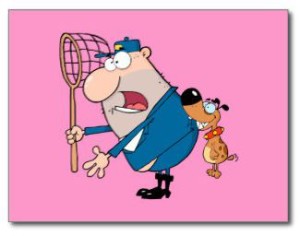It is the “dog days of summer” in Southern Ontario. And, of course, the moment I typed out that line I immediately had to go look up what the heck that actually means. I mean, do dogs specifically enjoy this kind of hot, humid weather? Do they mate more from mid-July to mid-August? Birth more? Die more? What exactly makes these days the dog’s days?
 Well, it turns out it has to do with the appearance of Sirius. No, not the radio, but a star in the constellation Canis Major, which, as one can probably surmise, translates literally as the “great dog” constellation. Sirius’ moments of glory run from either July 14th to September 5th, or July 3rd to August 11th, depending on whether you want to believe the Old Farmer’s Almanac or Anglo-Saxon history.
Well, it turns out it has to do with the appearance of Sirius. No, not the radio, but a star in the constellation Canis Major, which, as one can probably surmise, translates literally as the “great dog” constellation. Sirius’ moments of glory run from either July 14th to September 5th, or July 3rd to August 11th, depending on whether you want to believe the Old Farmer’s Almanac or Anglo-Saxon history.
My point… my point… (who needs a point?) Ah, right, my point! Expressions—more so, screwing them up—is what I wanted to talk about, and how, why, or should we use them in our writing. As in, I will literally lose my mind the next time someone corrects my use of “literally” to “figuratively.”
We all know that I don’t mean I will have an actual mental breakdown if somebody corrects me on this. By now we all know that using the term “literally” in the manner that I did up there is just a way to accentuate what is being said. A way to stress my, in this case, annoyance. And guess what? Merriam Webster agrees with me:
Definition of literally
- in a literal sense or manner : actually <took the remark literally> <was literally insane>
- in effect : virtually <will literally turn the world upside down to combat cruelty or injustice — Norman Cousins>
I do not know why this makes me feel vindicated, but it does.
You know what else drives me to distraction? This: “Don’t you mean that you couldn’t care less?”
Well, of course that’s what I mean. And of course the person who deigns to ask that question knows that’s what I mean. Everybody on this continent knows that’s what I mean. Not a single English-speaking person on this planet would hear that, sit back, and ponder how fewer cares I might have because I said that I could care less. We’ve all said it so many times the wrong way, and heard it so many times the wrong way, that by now we can hear it either way (couldn’t care less/could care less) and know they both mean the same thing.
 I’m no better, by any means though. For all the mistakes I make myself, there are still expression whoopsies that drive me nuts. “Nip it in the butt” is one of them, although it’s probably the mental image I get of someone chasing somebody else around the room trying to bite a piece of their ass that does it. “For all” or “with all intensive purposes” is another one and I have no reason that annoys me but word snobbery.
I’m no better, by any means though. For all the mistakes I make myself, there are still expression whoopsies that drive me nuts. “Nip it in the butt” is one of them, although it’s probably the mental image I get of someone chasing somebody else around the room trying to bite a piece of their ass that does it. “For all” or “with all intensive purposes” is another one and I have no reason that annoys me but word snobbery.
However, I will fight to the death (No. Not. Literally!) for my right to say “your guyses” if it’s okay to say “y’all.” “Sorta, oughta,” and “coulda” is right up there, too and I “ain’t” about to change that.
I know, you’re asking why I’m even bringing this up. Well, as is the case with most of my blog posts these days, I was presented with a question on tumblr and that question proved inspiring. So, here we are.
Mx. Anon wanted to know my opinion on using slang and expressions in writing. The answer was brief, and to the point. “Only in character speech,” I wrote. However, I didn’t go into the detail of why and I’m afraid it might have come off as dismissive or that I was thumbing my nose at the practise. That couldn’t be farther from the truth. (Or… could it be farther from the truth… no. No, I guess it doesn’t work both ways on that particular one, does it?) When I said, “only in character speech,” I should have said, “I strongly recommend it in character speech, actually.”
See, as much as Kelly might want to strangle me every time I say that “I could care less,” it’s become part of what I do when I talk. I say, “ain’t,” and “’eh,” and apparently every once in a while, “aboot.” (The jury is still out on that one. I am not convinced.
 I type, “I digress,” far too often in blog posts, and use terms like “no doubt” and “abso-fucking-lutely” too many times in both life and writing. It’s all part of my personal speech patterns, and I know where each and every one of them came from, and why I say it. I know that “’eh” instantly identifies me as Canadian, and “aboot” (if I do say it, which I don’t) does as well. I know that “ain’t” proves to everyone who hears it that I wasn’t raised in a high class boy’s school, and that “no doubt” tells everybody that I used to watch too much family-based comedies on television and had a special love for the snooty, dry humoured, often-sarcastic and stereotypical British character.
I type, “I digress,” far too often in blog posts, and use terms like “no doubt” and “abso-fucking-lutely” too many times in both life and writing. It’s all part of my personal speech patterns, and I know where each and every one of them came from, and why I say it. I know that “’eh” instantly identifies me as Canadian, and “aboot” (if I do say it, which I don’t) does as well. I know that “ain’t” proves to everyone who hears it that I wasn’t raised in a high class boy’s school, and that “no doubt” tells everybody that I used to watch too much family-based comedies on television and had a special love for the snooty, dry humoured, often-sarcastic and stereotypical British character.
So while I don’t think slang or silly/misused/funny expressions belong in narration, I do believe they are idea for character speech. It’s a great way to define a character without having to list every single point of who they are and how they got there. For example, the right misspoken expression can show how much (how little) education the character has had, where they were raised, and what kind of people they hung around with as they developed. If a character says to me that he got off “scotch free” or that he was “conversating” I know he’s probably not going to be the guy up for the big office promotion.
Or hell, maybe he is and the author’s going to surprise the bejeezus out of me. I kind of hope so, actually.
Point being, if your character would say it, include it. Just be cautious about using it outside of actual character speech. The reader does, after all, want to believe that the author knows what they’re doing.
I hope that answers the question a little more completely than my tumblr post did. Thank you joining me this month and I hope you enjoyed. Before you leave though, I’d really love to hear what expressions you’ve heard along the way that were absolutely bastardized from their originals? Does your family have any weird but most-beloved ones? Do you yourself use any, either by choice or accidentally? Share in the comments section and let’s see if we can’t get each other chuckling, shall we?
All my love, and until next time,
AF Henley <3
 Henley was born with a full-blown passion for run-on sentences, a zealous indulgence in all words descriptive, and the endearing tendency to overuse punctuation. Since the early years Henley has been an enthusiastic writer, from the first few I-love-my-dog stories to the current leap into erotica.
Henley was born with a full-blown passion for run-on sentences, a zealous indulgence in all words descriptive, and the endearing tendency to overuse punctuation. Since the early years Henley has been an enthusiastic writer, from the first few I-love-my-dog stories to the current leap into erotica.
A self-professed Google genius, Henley lives for the hours spent digging through the Internet for ‘research purposes’ which, more often than not, lead seven thousand miles away from first intentions but bring Henley to new discoveries and ideas that, once seeded, tend to flourish.
Henley has been proudly working with LT3 since 2012, including Henley’s newest novel, ‘Wolf, en Garde” which hit the shelves on May 17, 2016. For more information please stop by for a visit at afhenley.com


“Supposebly” drives me insane, especially when said by a supposedly educated person. My favourite expression “all behind like a cow’s tail” I nicked from my mother-in-law. And as I also live in Southern Ontario, it would be remiss of me not to remark about the weather…Man, if we don’t get some rain soon….I swear the grass was greener last winter than it is now.
Nice one! I am definitely going to have to borrow that one. Love it.
As for the weather, I was just commenting the other day that I don’t recall ever seeing the grass so collectively yellow. And daaaammmn it’s been hot. Still better than snow, in my opinion, but hot and muggy nonetheless.
Thank you very much for commenting and reading!
My little brother when we lived in northern Minnesota developed a slight accent saying “aboot” and dragging out his vowels in other words. We teased him mercilessly about it. xD Sadly after years of living down south he’s lost it. We didn’t tease him because it was a bad thing, but rather because he was the only one who did develop it. And he could never tell he was doing it until we pointed it out.
I also had a friend that said “literally” a lot, but he rarely meant it in a virtual or figurative sense. He’d usually emphasize how “literal” an actual literal situation was. Which is fine, but sometimes he’d use it and you’d wonder why he felt the need to explain how literal it was because you couldn’t imagine there being a virtual or figurative option.
“He got hit by a cannonball and it literally blew a whole in him.” What would the figurative hole be from a cannonball hitting you?
Throughout my life I’ve gone through several ways of saying common phrases incorrectly. “Suppost” to “supozed.” Some sayings that are often left incomplete I completed with really bad changes. It wasn’t “When in Rome” (do as the Romans do) it was “When in Rome, stuff your face.” In fact it drove me nuts every time someone said “When in Rome” because they never finished the saying and it always seemed like there was more to it than that. “When in Rome…what?” I would ask. And they didn’t know. So I made up my own endings. There was the “eyes of march” which I thought meant Leprechauns.
Also made up a few sayings that weren’t quite wrong, just off. They were designed to elicit a response of some kind. “Well paint me blue and call me luggage.” Instead of calling a lie “bologna” (or balogny as I pronounce it) I would say “I could chew a face out of that and put it in my mouth.”
I’ve annoyed many with my poor speech and writing patterns. And I don’t intend to stop now. xD Also “ain’t” used to be used by high society, if they hate it so much they shouldn’t have invented it. They knew the lower classes would mimic.
That is brilliant and hilarious, Frosty! Thank you so much for sharing!
I love the idea of making up your own half-cocked expressions. <3
I’ve been called out before for saying “you’ve got another thing coming to you” because the correct iteration is “another *think*”. But you’d have to search the US pretty hard to find anyone who says it the “correct way”.
I know people who get high and to the right about “for all intensive purposes” too. Sure, I understand why, but it’s never seemed like a thing worth getting that upset over.
And people aren’t misrepresenting these expression because they’re stupid or ignorant. The expressions we use and how we use them can be shaped by our environments and where we’ve lived. Some people say lightning bugs; others, fireflies.
Or sometimes it just comes down to: that’s how I’ve always fucking heard it.
I say things like “might could” because in the area I live in, that’s a valid and acceptable phrase.
I couldn’t agree more. Expressions evolve just like words do. Besides, Judas Priest couldn’t have possibly been wrong, could they? If this means anything at all, I didn’t even know the saying was “think” until I looked up another saying for this post. So, go figure.
And I remember the first time I heard the phrase lightning bugs I had to go look up what they were. I had no idea.
Thank you very much for reading and commenting!
Think is the correct term? I always thought my mother was butchering it to fit and she was right all along? God fucking damn it.
You say no English speaking person wouldn’t understand ‘could care less’ but when I first read that I genuinely thought it was a typo and then as I kept seeing it, usually in American YA novels, it really confused me, and then grated a lot, and now I /kind of/ accept it, but… no. In my head I always correct it.
As for my word usage, I use ‘chicken’ as a term of endearment for small things like my rats, which I think is actual slang, but I never heard it before so it probably it evolved from ‘chick’ or ‘duck’, which is what my nan used to call us a lot as kids, although that’s a Midlands thing and she’s from Kent, so possibly something she picked up in the WAAF. Her slang is great, proper WWII like always referring to Germans/Germany as Gerry and ‘super’ or ‘marvellous’ which I’ve never heard anyone under the age of 80 use In that vein (vain?) I tend to use ‘sweet’ a lot, which I picked up from a friend, who probably picked it up from watching a lot of American TV. Before that it was ‘awesome’ which came from watching obsessive amounts of Supernatural.
In that vein (vain?) I tend to use ‘sweet’ a lot, which I picked up from a friend, who probably picked it up from watching a lot of American TV. Before that it was ‘awesome’ which came from watching obsessive amounts of Supernatural.
Regionally I often say ‘to’ on the end of sentences that don’t need it, which drives some people who aren’t from the South West/Somerset mad, i.e. “Where’s that/it to?”
Dumb things I do is pronouncing words/names I’m not sure about as if they’re French or with soft Js (Y) when they’re meant to be hard Js. I like to overcomplicate things. Which I guess is just a hazard of learning most of your vocabulary from independent reading.
My grandmother would call us Turkey when we were being a little too childlike or made jokes. Never used fowl in a cute “you’re adorable” way though. xD
You turkey. XD
Ha, I love that!
Those are great! Thank you very much for sharing them.
<3
For quite some time I was contemplating if I should loose up on my English and here comes your excellent blog post and sweeps all such thoughts aside! XD
What drives me crazy in my language? Most certainly that one phrase that comes up every year on New Year and a few days after that. It is customary here (like in most countries) to wish a “Frohes Neues Jahr” (”Happy New Year”). But for years it became customary to only say: “Frohes Neues” (“Happy New”).
It is incredibly annoying (my deepest sympathies to you Frost) that they do not say the whole phrase. To me, please forgive me for sounding arrogant, it sounds like the person saying it never took part in our country’s educational system. It is meant to sound casual but to me it only sounds cheap and uneducated. Every time and with an increasing show of annoyance I ask: Happy New…WHAT?! XD
But to be honest?
I do love that ”eh”!
<3
*laughs* Well you know, my friend, it doesn’t surprise me that you would want the saying to be complete and accurate. I’m not saying you’re a bit of stickler for detail, but… XD
Thank you, buddy. And I will always love your “Ach Menno!”
I’ve been a little fed up with the English language lately, so mostly it’s re-learning Chinese. My biggest annoyance is people using singular nouns such as “Everyone, Everybody, Each person” and then following it up with “their.” I get it, it was the only way for people to be gender neutral (not, there wasn’t any such thing back then), I suppose.
It is absolutely annoying to have someone (American Tutor) beat into me “the correct way” just to come over here and realize… most people don’t use it and then has the audacity to tell me my English sucks.
Not that I disagree… but come on! Pot calling the kettle black! =P
Or is it the other way around? I get them confused.
In all honesty though, even I’m thawing. I don’t care. As long as one gets the correct message across, fine. It’s when a potential misunderstanding could happen that makes me feel people shouldn’t slang too much. World isn’t comprised of English-speaking countries and all, and even the English speaking ones can’t understand each other when slang gets too nutty.
Thank you for sharing! <3
And that’s just the thing, when we say often enough, it becomes right in the fact that everyone recognizes what we “mean” to say.
However, I use the gender neutral “their” if I’m not 100% positive of the person’s standing on terms, or if I’m using a fictional “any person” so as to be inclusive.
You’re welcome! Thank you for reading!
I enjoy listening to the slang change as my teens use and discard various phrases. In our house a lot of slang is extremely family-centric, and movie based. Like when on a simple errand no one likes to hear “We’re going on an Adventure!” It means things are likely to get complicated and take forever. And we’re probably lost.
Slang is so malleable, I don’t often care if it gets misquoted. There are bigger hills.
Also, A.F., I don’t say aboot, either. people are hearing funny.
*highfives* Exactly! XD
And I absolutely love, “We’re going on an Adventure!” What a great way to explain a not-so-necessarily-great moment. Love it.
Thanks so much for reading and sharing! <3